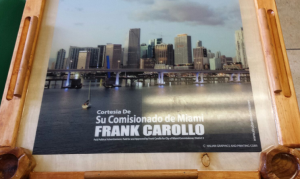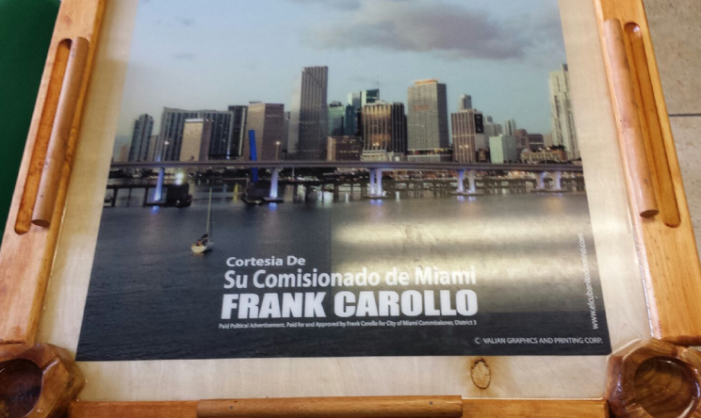Now that Miami Commissioner Francis Suarez has bowed out of the mayoral race and nobody came out of the shadows to replace him, we only have two races worth watching. And one of those is the fight by Commissioner Frank Carollo to keep his seat against challenger Alex Dominguez.
 Carollo may have a little questionable edge in one crucial place: The 2,000 or so quality voters at the Haley Sofge public housing towers across from the Miami Marlins Stadium get to see his name every day now. And those who play las fichas may feel obligated to vote for him in gratitude for a domino table that appeared suddenly in their recreation room Oct. 4 — just 12 days before absentee ballots dropped in his re-election campaign.
Carollo may have a little questionable edge in one crucial place: The 2,000 or so quality voters at the Haley Sofge public housing towers across from the Miami Marlins Stadium get to see his name every day now. And those who play las fichas may feel obligated to vote for him in gratitude for a domino table that appeared suddenly in their recreation room Oct. 4 — just 12 days before absentee ballots dropped in his re-election campaign.
This table is actually stamped with a political campaign disclaimer. “Cortesia de Su Comisionado Frank Carollo,” it says, and then in smaller type: “Paid political advertising, paid for and approved by Frank Carollo for Commissioner, District 3.” Just in case anyone is confused as to where it came from.
Both the Haley Sofge administrator Yolanda Reyes and the spokeswoman for Miami-Dade Housing Annette Molina said the table had been something the residents asked Carollo for at a previous event at the towers. When he went Oct. 4 to have his little pre-election party, he brought them the gift, Molina told Ladra.
“What they told me was that the residents had asked for it,” Molina said.
But is that even legal? Maybe he should have given it to them over the summer. Or last year. Or after Nov. 5. Because this smacks of a campaign violation.
Ladra raised the issue with Joe Centorino, head of the Miami-Dade Commission on Ethics and Public Trust.
“It really depends on who is responsible for this happening, and the circumstances under which it is being allowed,” he told me. “Is it someone in the management there or someone who lives there, or someone connected to the campaign? Is it the result of some open process whereby all candidates are given the opportunity to do the same thing? All of these things would have to be considered before determining what the issue is.”
Then he told me they are going to ask the questions. “We will find out,” Centorino said.

But I can tell him right now that Alex Dominguez, the pharmaceutical salesman who is running against Carollo, has certainly not been given the same opportunity. And I can tell him, even though he thinks that Ladra can’t know, that the campaign is responsible. I mean, it says so right there on the tabletop.
It’s a pretty smart move. The Haley Sofge Towers and the Robert King High Towers next door are a treasure trove of votes for anyone who can get them.
Carollo did not answer several calls to his commission office and messages left on his campaign phone.
Dominguez, the pharmaceutical salesman who is running against the incumbent, said he did not think it was a coincidence that the domino table conveniently arrived at the Miami-Dade public housing complex less than two weeks before the absentee ballots.
“It’s wrong,” Dominguez said. “And it’s going to set a dangerous precedent for future elections if it is allowed. Who’s to say I don’t go in there tomorrow and bring them a Stair Master. It will become like an arms race.”
Dominguez said that in his industry, he might be able to have lunch with a doctor. “But anything over $50 in value is a bribe,” he added.
Ladra can’t believe this isn’t illegal. Because then, where would it stop? I mean, if one candidate can buy a domino table, what’s to stop another candidate from buying a surround sound entertainment system for the community room? What’s to stop some PAC from buying them a brand new passenger van?
What’s to stop Miami Beach mayoral millionaire candidate Philip Levine — who has been taking senior voters to lunch and threw them a big “senior prom” party — from buying everyone on the Beach a new high-definition, plasma TV? Or at least for all the 4s and 5s (high performance voters).
The point is, as Deputy Miami-Dade State Attorney Howard Rosen said Thursday at the Good Government Initiative’s panel on political corruption (more on that later), it’s the proverbial “slippery slope.”
And if this is not illegal, then someone needs to find a way to make it illegal or otherwise curb this kind of activity, which certainly gives off the perception that someone is trying to buy votes.

